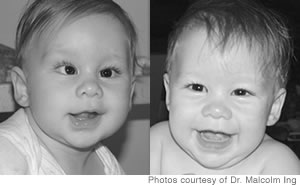
Improving Vision, Appearance
September 12, 2007
By Dr. Malcolm Ing

Chloe, on the day before and after surgery to correct strabismus, or crossed eyes

|
You help children with strabismus, or crossed eyes, through surgery, which you recommend having done before age 1 and as early as 6 months old. Why so young?
The timing of surgery has to be early to get the processes developed in the brain. The study I did shows the best results occur when you align eyes before age 1.
How do you make parents feel comfortable about surgery for their children?
In general they want to know what you would do with your own child. I explain that knowing the good that can result from the surgery, I would want my own child operated on at 5, 6 months old or before 1 year. Once you get the eyes in line, the process of binocular function can begin - depth perception can develop.
So this is more than cosmetic?
Much more than just cosmetic surgery. The pediatric ophthalmologists I trained with were pioneers in this field. They said we can do better than a cosmetic operation. The first good result was actually one single case in 1958 by one of my mentors, and this is what stimulated my whole interest in this area.
How do we use depth perception?
It allows you to know where you’re putting a cup down on a table, it allows you to drive when you grow up, to hit a ball when you play tennis or baseball. It is required to have good depth perception for any job that involves driving, flying. It’s important for a surgeon, too. Women use it for threading needles - you can see how much more difficult it is if you thread with one eye. There’s so many practical activities that are involved.
Tell us about Chloe, who’s pictured. She had crossed eyes.
Her parents, both physicians, thought Chloe’s eyes might be crossing. I confirmed it. When she was 9 months old we did a surgical procedure, and those pictures (above) were taken the day before and the day after.
In some cases they will start crossing again. Although her first surgical result looked really good I had to do another surgery six to eight months later. After that it was fine.
How is she doing?
She’s doing great. She has depth perception, she plays sports, she’s now about age 7 or 8.
Do all cases of crossed eyes require surgery?
Yes, if they’re totally crossed at birth they’ll require surgery. Glasses may be used sometime during the treatment. There’s no such therapy as eye exercises to strengthen the eye position for these infants.
You say the first six years are very important to the development of good vision. What should parents look out for?
In the early stages of development, from 3 to 6 months, they should make sure their child’s eyes are straight or if there’s any question about it, they should bring it to the attention of a pediatrician, who can do a basic test, or family doctor so they can get a referral to an ophthalmologist.
In some cases people aren’t suspicious enough and you get a tragic delay. And although strabismus is way more common than an eye tumor, that can be a cause of eye crossing. I had four such cases. All were lethal forms, but fortunately all of them lived. It’s always better to be on the safer side.
How common is strabismus?
In my referral practice I see a high percentage - 20 to 30 percent. In the general population it’s 4 to 5 percent. It’s not that common.
Your bio says you “love to help children with crossed eyes achieve beautiful straight eyes through surgery.” Why do you love it?
I was interested in art early in my career, and my dad who was a physician once told me, ‘You can be an artist with surgery as well as you can be an artist with a painting brush.” I never realized the significance of that until much later when I was able to make these children with crossed eyes look much better.
You’re also a surfing champion. You won the state Legends division championship in 2003 and 2004, and second place at the long-board meet at Sunset Beach in April.
(Laughs) I wouldn’t emphasize that, but I have been able to compete in the legends division of surfing so I’m not a champion against young guys. I only compete in the older age groups, and I have fun, that’s all.
This information is provided as educational and is not intended as a substitute for consultation with a physician. For questions, consult your physician.